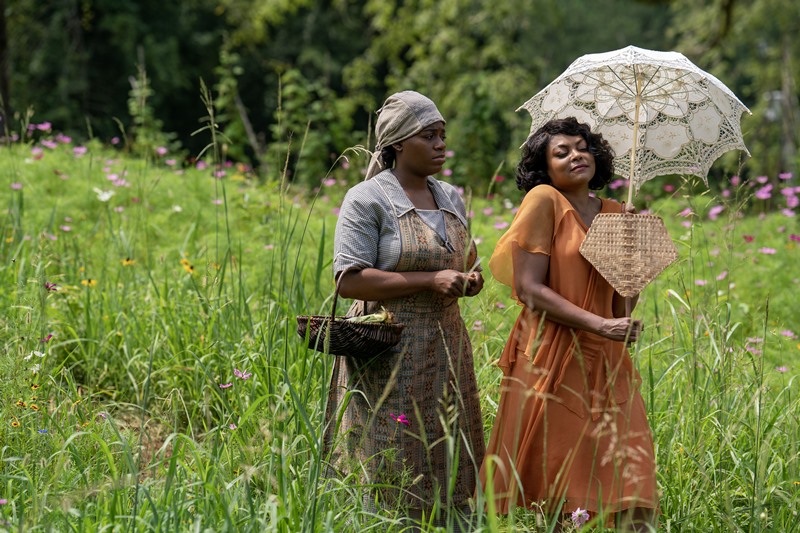Review: ‘The Color Purple’ sings its way through joy and sorrow

A scene from ‘The Color Purple’ courtesy of Warner Bros. Pictures
‘The Color Purple’ is the musical account of a woman who overcomes years of mistreatment to realize her own dreams of self-reliance.
Alice Walker’s novel, The Color Purple, won the Pulitzer Prize for Fiction in 1983. Two years later, it was adapted for the screen for the first time, directed by Steven Spielberg and starring Whoopi Goldberg in her feature debut. The film was critically acclaimed, a box office success and received multiple award nominations, though there was also a lot of criticism for its negative portrayal of Black men. The story was reimagined in 2005 for a Broadway musical, which won two Tony awards when it was revived in 2015. Now, the song-filled version of the narrative has been adapted for the screen once again in 2023’s The Color Purple.
Celie Harris (Fantasia Barrino) was abused from an early age, bearing two of her father’s children, but not being allowed to raise them. As a teen, she’s married off to an older widower, Albert ‘Mister’ Johnson (Colman Domingo), where her abuse continues. When Celie’s younger sister, Nettie (Halle Bailey), runs away from home to avoid similar treatment, they promise to stay connected and write every week. In the meantime, Celie forms a bond with Mister’s mistress, Shug Avery (Taraji P. Henson), a nightclub singer and self-confident woman, and is inspired by the strength of her step-son’s wife, Sofia (Danielle Brooks), who is not afraid to stand up for herself — qualities Celie wishes she possessed.
Celie’s story is that of a woman who must find her voice, and learn to love and value herself so she can defend herself from those who mean her harm. It’s a long and difficult journey that takes most of her life, though she finds small moments of joy in caring for those she loves. Conversely, Shug is a free spirit that does what she wants when she wants, even when it comes to Mister, which Celie finds mindboggling since she has no say in her own home. Similarly, Sofia is another of her female role models even though she’s younger than Celie because Sofia refuses to be pushed around — though her spirit is nearly broken by overwhelming circumstances.
The film features a range of music that melodically expresses the characters’ feelings, while also drawing viewers in with its eloquent lyrics. The compositions range from rhythmic work songs to soulful blues to New Orleans jazz to gospel. It’s an energetic soundtrack filled with the singer’s personality and passion, whether they’re lamenting their hardships, declaring their confidence or celebrating their achievements. It also makes an otherwise grim story far more palatable.
Even though the characters’ resilience is tested by many horrific circumstances, the overall message is one of empowerment. The women in the picture realize they have strength in each other with Celie in particular finding inspiration in the more assured women around her. To that end, the actresses in the film are exceptional. Barrino convincingly struggles under the iron fist of the men in her life, growing meeker under their rule before finally exploding with courage and dignity. However, she is expectedly — and perhaps intentionally — overshadowed by the inherently larger-than-life performances of Henson and Brooks, who also have some of the film’s most rousing musical numbers. Even though it’s a movie about sisterhood, it would be a disservice not to mention Domingo’s outstanding portrayal of Mister, whose complex personality is integral to the other characters’ growth.
Director: Blitz Bazawule
Starring: Fantasia Barrino, Taraji P. Henson and Danielle Brooks
Review: ‘The Color Purple’ sings its way through joy and sorrow
#Review #Color #Purple #sings #joy #sorrow





